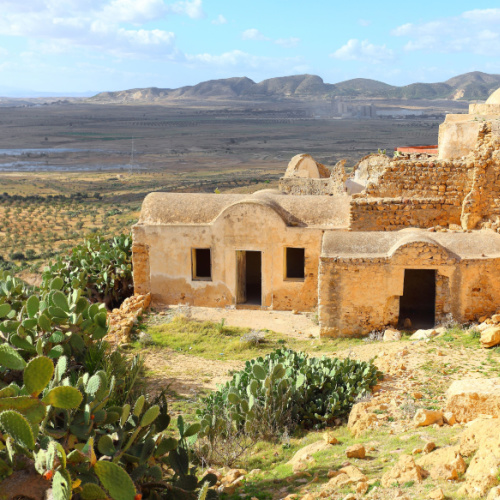
cpaulfell/Shutterstock
When Is the Best Time to Visit Tunisia?
The best time to visit Tunisia is during the shoulder seasons of spring (April to June) and fall (September to November). During these months, the weather is generally mild and pleasant across most of the country, with fewer crowds and lower prices than during the peak summer season.
Here are some of the benefits of visiting Tunisia during the shoulder seasons:
- Mild weather: Tunisia has a Mediterranean climate, with hot, dry summers and mild, wet winters. The shoulder seasons offer mild and pleasant temperatures across most of the country, making it ideal for sightseeing, exploring, and enjoying the outdoors.
- Smaller crowds: The shoulder seasons are less crowded than the peak summer season, so you’ll be able to enjoy Tunisia’s popular tourist attractions without having to deal with large crowds. This is especially important if you’re visiting popular destinations like the city of Tunis, the ruins of Carthage, and the beaches of Hammamet and Sousse.
- Lower prices: Prices for flights, accommodation, and activities are generally lower during the shoulder seasons than during the peak summer season. This means you can save money on your trip without having to sacrifice quality.
Here are some specific examples of how you can enjoy the most of Tunisia during the shoulder seasons:
- Spring: The weather in spring is typically sunny and warm, with occasional showers. This is a great time to visit for exploring the ruins of Carthage, hiking in the Jebel Chambi National Park, and relaxing on the beaches of Hammamet and Sousse.
- Fall: The weather in fall is also typically sunny and warm, with occasional showers. This is a great time to visit for exploring the city of Tunis, visiting the Sahara Desert, and attending the International Festival of Carthage.
No matter what time of year you choose to visit Tunisia, you’re sure to have a wonderful time. With its stunning scenery, rich history, and diverse culture, Tunisia is a truly unique and unforgettable travel destination.
 Average Temperatures by Month
Average Temperatures by Month
|
Jan |
Feb |
Mar |
Apr |
May |
Jun |
Jul |
Aug |
Sep |
Oct |
Nov |
Dec |
| Fahrenheit |
55°
|
57°
|
61°
|
68°
|
75°
|
83°
|
90°
|
90°
|
84°
|
74°
|
64°
|
57°
|
| Celsius |
13°
|
14°
|
16°
|
20°
|
24°
|
28°
|
32°
|
32°
|
29°
|
23°
|
18°
|
14°
|
Climate in Tunisia
Summer Season in Tunisia
Summers in Tunisia are typically hot and dry, especially in the inland regions. Coastal areas benefit from the Mediterranean Sea's moderating influence, offering slightly cooler and more comfortable conditions. This season is characterized by abundant sunshine, minimal rainfall, and is popular for beach tourism along the Mediterranean coast.
Rainy Season in Tunisia
The rainy season in Tunisia coincides largely with autumn and winter months. This period sees the majority of the annual rainfall, particularly in the northern regions. The rain is generally not continuous but comes in sporadic, sometimes heavy, downpours. This season also sees a drop in temperatures compared to the summer months.
Winter Season in Tunisia
Tunisian winters are mild and wet, especially along the coast. Inland areas, particularly in the south, can experience colder temperatures, but overall, the climate remains relatively temperate. Rainfall is more frequent during this season, and the temperatures are cooler, offering a break from the intense heat of the summer. This season is ideal for exploring the cultural and historical aspects of Tunisia without the extreme heat found in the summer months.
Our Recommendations
| Destination |
Jan |
Feb |
Mar |
Apr |
May |
Jun |
Jul |
Aug |
Sep |
Oct |
Nov |
Dec |
| Tunisia |
 |
 |
 |
 |
 |
 |
 |
 |
 |
 |
 |
 |






